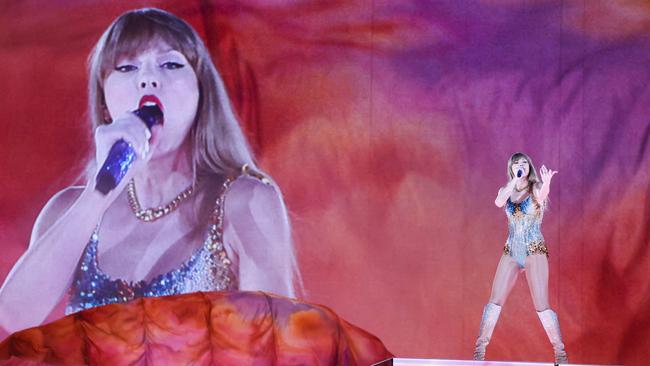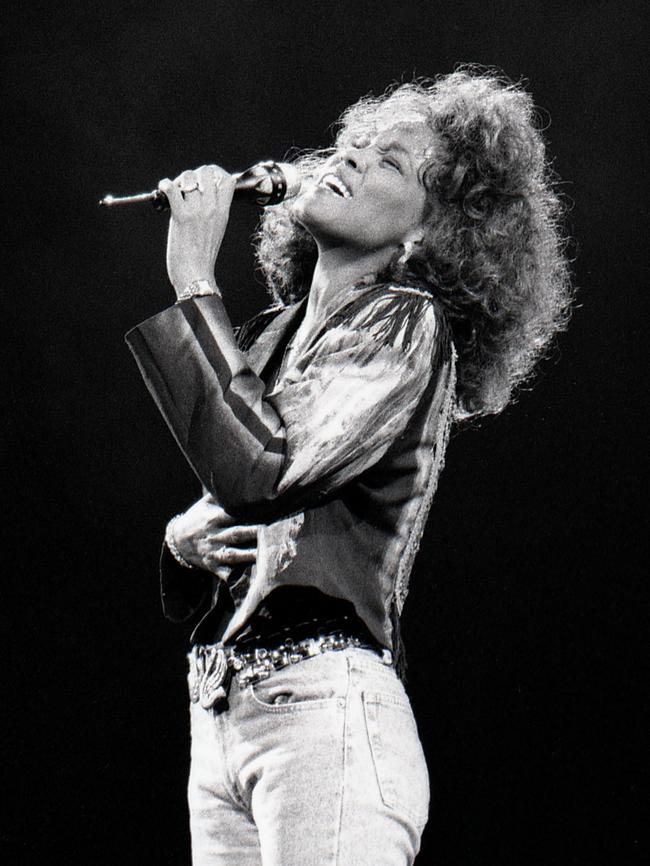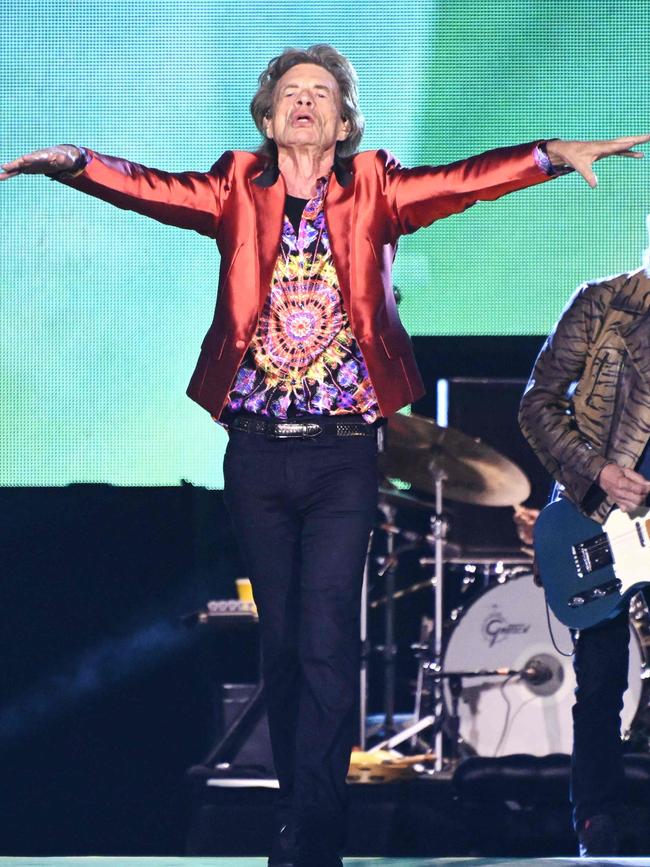
It’s a long time since we’ve seen a single entertainer with such vast appeal. Does it have any broader cultural meaning?
I confess to not having been a Swiftie. If you’re not familiar with her work, at first it’s a little difficult to work out what the fuss is all about. There are a lot of popular entertainment boxes she doesn’t quite seem to tick.
Although certainly attractive, she’s not the classical beauty, say, of Scarlett Johansson – a male equivalent I guess would be Brad Pitt. That’s a superficial quality for sure, but sheer physical beauty is a factor for many entertainers.
She’s not intentionally provocative like, say, Miley Cyrus. The best male equivalent I can think of there is Mick Jagger in his pomp in the early glory days of the Rolling Stones (I know that’s a long time ago, forgive boomer references here). Nor does Swift’s voice have the astonishing, perfect power of a Whitney Houston. Rather, Swift has perfected the pop song, and the sense of intimate storytelling, though she defies genres.


One cultural aspect of her success worth noting, and that is certainly cause for some celebration, is that she makes joy, even niceness, a central part of her offering.
That’s a wonderful thing in a culture that is often negative, hostile, cruel, self-referentially “edgy” and in perpetual faux rebellion, constantly celebrating transgression.
I had my rock concertgoing days some little time ago. The Sydney Showground’s Hordern Pavilion was the big venue then. I recall great performances from Billy Joel, Supertramp, Lou Reed, Elton John.
Even in the 1970s, live concerts were a visual spectacle, but compared with the magnificent choreography and razzle-dazzle of a Swift performance they were static. The main visual effect was lights. Reed was surprisingly theatrical but the best was Joel. He had a brilliant patter. His mastery of the piano was fantastic. It seemed he could make it do anything, and you expected it to jump and dance across the stage with him.
Joel was very funny and began one performance with a series of mini-pastiches of other artists whose style he had considered adopting. Joel rendering one of his own songs in the voice and manner of Bob Dylan is unforgettable.
While a mere fan cannot judge these things, Joel seems a perfectly nice bloke. He took an advance for a memoir, then decided not to publish it and returned the advance. He didn’t think the people in his life needed their private selves put on public display via his memoirs.
But, and here’s the point, Joel was more or less obliged by the milieu to craft some lyrics that were hostile to niceness, even to goodness. Famously, he’d rather laugh with the sinners than cry with the saints because the sinners have much more fun. But when you think of the human evil that sin encompasses this is almost nihilistic.
Similarly, Piano Man, though beguiling, is an absolutely standard lament of bargain-basement existential alienation. Likewise Captain Jack.

The best art, even in popular culture, searches for truth and affirms the goodness of life. Consider two iconic songs from two of the Beatles.
John Lennon wrote Imagine, and it’s a kind of secular hymn to nihilism. If only there was no God above us, and no hell below, then all the people would be living as they should. You think?
Paul McCartney’s songs were almost always in the positive register and his greatest, Let It Be, is one of the most extraordinarily consoling, and ultimately religious, compositions of the 20th century. It’s not a manifesto, like Imagine. It’s a story, like the stories Swift tells. It’s explicitly about McCartney being visited in consoling dreams by his mother, Mary, who died when he was a young teenager. Like the best narrative art, it shows rather than tells its point of view.
McCartney has confirmed he consciously, deliberately wrote the story with a double meaning. “Mother Mary” was also intended to refer to Mary, the mother of Christ. The song is full of words from the Bible. The song’s title, Let It Be, are the words of Mary in response to the archangel Gabriel: “Behold I am the servant of the Lord. Let it be done to me according to your word.” This is the first, great radical Christian commitment in the New Testament.
McCartney, a Liverpool Catholic and one of the most gifted songwriters of the 20th or any century, knew exactly what he was doing, and he did it subtly. “Still a light that shines on me” directly draws on John’s gospel.
There’s nothing quite like that in Swift. But she has declared that she’s a Christian, and we should take her at her word.

She was brought up in a Christian home and, at 34, loves her parents and brother and seems never to have fallen out with them. But surely resenting your parents is an essential cultural rite of passage, if not an eternal world view, particularly to blame your parents for whatever problems you have, in so much popular culture over the past 50 years.
Yet at Swift concerts, overwhelmingly popular with girls and women, you routinely see grandmother, mother and daughter together, and men in gently ironic Swiftie dad T-shirts claiming, with transparent fraudulence, “I’m here for my daughters”.
Swift has her musical roots in country and western, the most routinely religious popular music tradition. This, gospel music, which produced Houston, and jazz are three great modern musical cultures entirely invented in America.
Occasionally Swift makes a reference to God, and to Jesus, in her songs, but very rarely. She’s not at all a professional Christian singer who makes overt Christianity a central part of her work. But neither does she disparage religion in general or Christianity in particular.
Some pro-Trump Republicans can never forgive her for endorsing Joe Biden at the last presidential election. But Swift doesn’t generally do politics at all. Finding Trump beyond the pale is fair enough and doesn’t indicate Swift is a closet communist.
Often enough she is attacked, almost insanely, from the ideological left. One reason the left will never finally triumph is that they can never take yes for an answer. And they are profoundly offended by any sign of normality, especially in their own ranks, or the ranks of those they expect to find sympathetic.
I’m indebted to Gerard Henderson for highlighting a quite dotty piece recently in The Saturday Paper entitled “The exclusionary power of Taylor Swift”. The piece claimed: “In Swift’s world, you do not have to feel guilt or shame about white privilege – you embrace it.” And much more along those ridiculous lines.
Similarly, you couldn’t imagine a more gracious piece of writing than our great historian Geoffrey Blainey’s meditation on Swift in The Weekend Australian a few days ago. It, too, was subject to ludicrous attack from left-wing academics.
Anthony Albanese was much smarter than this. He and his fiance were in the audience of a Sydney Swift concert. So was Scott Morrison and his wife and daughters. Morrison comments: “It was a positive night, affirming, optimistic.”
Swift performed for 3½ hours. She’s manifestly dedicated to her craft. A modern giant of popular culture who likes her country, her faith, her audience, her football-playing boyfriend and even apparently likes God, too. I don’t know how she has managed it, but in this case, pace Ecclesiastes, let the race go to the Swift.








Is Taylor Swift a conservative or a progressive pin-up icon of popular culture? The answer is both and neither. But conservatives who shun her are crazy.